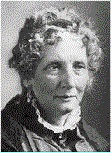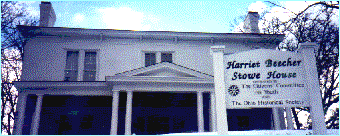|
Harriet Beecher Stowe

Harriet Beecher Stowe (1811-1896) - Author
Harriet Elizabeth Beecher, the seventh child of a leading Protestant
preacher, was born on June 14, 1811. In 1836, she married widower Calvin Stowe, and to
help support her family of 5 children she wrote 10 adult novels, poems, biographical
sketches, children’s stories, travel books, and her most famous work, "Uncle
Tom’s Cabin" (1852). It was serialized in the anti-slavery weekly, the
"National Era", gaining her international recognition as an outspoken
anti-slavery advocate. Her book has been translated and sold throughout the world.
Many of her impressions about slavery were gained during the
eighteen years she lived with her parents, then later her husband and family, in
Cincinnati. A city with its famous Underground Railroad connections, it was located across the Ohio River from Kentucky, a slave state. It is also
reputed, that prior to the publication of her book she ran an Underground Railroad station
in Walnut Hills, near Cincinnati.
Her preacher husband was an avowed abolitionist and together they
made frequent visits to Kentucky to see the affects of slavery, and hear the terrible and
moving stories recounted by runaway slaves. To refute critics who claimed the book was
inauthentic, she wrote, "A Key to Uncle Tom’s Cabin" (1853) that
documented the realities on which the book was based. In 1856, she published, "Dred,"
a second anti-slavery novel. Harriet was a realist in her writings; detailing the
complexities of the cultural social life and characters of her time, providing a unique
insight into pre-Civil War America with its contradictions and dilemmas. Turning a bit
eccentric in later years, Harriet Beecher Stowe died at the age of 85 in Hartford,
Connecticut.

The Harriet Beecher Stowe House, 2950
Gilbert, Cincinnati, Ohio.
It is operated by the Citizens' Committee on Youth and the Ohio Historical Society.
'Black History' segment
written in June, 1998 by David Lodge
[ Back to Black History Index ]
|

